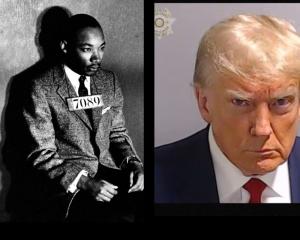
This morning I was reflecting on 2 instances of men being detained in a Southern jail. One of them was an ex-president and the other a famous civil rights leader. One of them was detained for eight days and witnessed cruelty and mistreatment of his fellow detainees, the other was detained for 20 minutes and handled with kid gloves while being surrounded by his personal security detail.
One was speaking truth to power, the other trying to retain power at great expense to everyone involved.
One of them continued his selfish tantrum and exclaimed:
“I thought the election was rigged election, a stolen election, and I should have every right to do that.”
The other composed a letter that took me a half day to digest, as it challenged and informed me and brought me to tears. I feel like I’m just getting started with this challenging letter written 60 years ago that coherently addressed the civil rights issues of others and, possibly, the issues of the current day.
I will do my best to be respectful of things that are hard for me to understand because of my privilege. I want to be aggressive and force people to understand, but part of me knows that it takes a long time to cultivate wisdom, and for many, it’s a very low priority in favor of being accepted.
The letter begins:
“16 April 1963 My Dear Fellow Clergymen:”
Everyone wants to blame someone for the things that trouble them. Most of our practice in politics and religion is a common enemy intimacy. We tend towards criticism of those we see as adversaries, and we all hate the same people. Sometimes it’s the devil, sometimes it’s the other party, and other times it’s the other religious people who didn’t “get it right.” Most of us spend more time criticizing the enemy instead of examining ourselves. Although this letter places blame where appropriate, it also seems to be a healthy self-examination of himself and the others closest to him.
More on that later.
“We know through painful experience that freedom is never voluntarily given by the oppressor; it must be demanded by the oppressed.”
If we study history, it’s easy to see how people in power do not change oppressive practices, usually until their own livelihood is threatened. The people who are oppressed usually risk everything to speak up. Whether this is a victim of racial injustice, an abuse survivor, or someone who wants to challenge the status quo of religion or politics, the standard practice is to ignore, deflect, gaslight, and even punish those who dare to challenge power.
Let the following quote seep into your consciousness.
“I have almost reached the regrettable conclusion that the Negro’s great stumbling block in his stride toward freedom is not the White Citizen’s Counciler or the Ku Klux Klanner, but the white moderate, who is more devoted to “order” than to justice; who prefers a negative peace which is the absence of tension to a positive peace which is the presence of justice; who constantly says: ‘I agree with you in the goal you seek, but I cannot agree with your methods of direct action;’ who paternalistically believes he can set the timetable for another man’s freedom; who lives by a mythical concept of time and who constantly advises the Negro to wait for a ‘more convenient season.’ Shallow understanding from people of goodwill is more frustrating than absolute misunderstanding from people of ill will. Lukewarm acceptance is much more bewildering than outright rejection.”
I cannot read the previous quote without crying. Time after time I see this in religion. Being a pastor of a conservative, evangelical congregation, too often we settled for a temporary peace instead of seeking true justice. Most churches and political organizations are cloaked in their belief that they are doing a few good things, and in the long run, it’s not anything that ever reaches the top of their priority list. Lincoln believed that slavery would just fade away eventually. The religious person says, “it will be better by and by.” The pseudo-activists say, “I understand your struggle,” but don’t expect me to sacrifice anything or take positive action to help you. I have enough problems keeping what I have inherited.”
We love to criticize extremists, but the reason extremism persists is because the “moderates” generally fail to act. Progressive Christianity and politics suffer from this malady probably even more than the religious and political extreme. I agree that those who preach hate and persecute progress are the initial problem, but it is those of us who recognize the problem and never risk what we have to stand up for the oppressed that bear much of the blame. As survivors, racial minorities, and other marginalized people cry out, all we seem to do is blame it on the other guy.
Abuse happens when we elevate a person or group above another and build platforms for them to propitiate their power networks. CEOs, Pastors, Religious Celebrities, and politicians may be the oppressors, but it is their followers, “who prefer a negative peace which is the absence of tension to a positive peace which is the presence of justice,” are the enablers.
“We must come to see that, as the federal courts have consistently affirmed, it is wrong to urge an individual to cease his efforts to gain his basic constitutional rights because the quest may precipitate violence. Society must protect the robbed and punish the robber. I had also hoped that the white moderate would reject the myth concerning time in relation to the struggle for freedom.”
Before the progressive choir warms up ready to shout “Hallelujah,” I challenge you to evaluate what you’re doing. If the “good” church people are really for justice, why are churches still segregated, why are these festivals still 99% white, and why do many of these platforms still contain known abusers left over from the Marc Driscoll era?
Maybe instead of platforming, we should start performing. Comparing ourselves to the evangelicals or conservatives is a very low bar and enabling the power structures and patriarchies is a malady that affects all of us.
“We will have to repent in this generation not merely for the hateful words and actions of the bad people but for the appalling silence of the good people. Human progress never rolls in on wheels of inevitability; it comes through the tireless efforts of men willing to be coworkers with God, and without this hard work, time itself becomes an ally of the forces of social stagnation.”
There is no change that comes from good intentions alone. Enough said.
“Oppressed people cannot remain oppressed forever. The yearning for freedom eventually manifests itself.”
“In the midst of blatant injustices inflicted upon the Negro, I have watched white churchmen stand on the sideline and mouth pious irrelevancies and sanctimonious trivialities.”
Something in us longs to be free. As King points out, it’s a yearning! But as he stated above, it doesn’t happen without co-workers and advocates. How do you want to be remembered—a fan who cheered from the stands and delayed the inevitable or one who entered the arena and hastened the victory and reduced the overall suffering?
“Perhaps I must turn my faith to the inner spiritual church, the church within the church.”
“I have consistently preached that nonviolence demands that the means we use must be as pure as the ends we seek. I have tried to make clear that it is wrong to use immoral means to attain moral ends. But now I must affirm that it is just as wrong, or perhaps even more so, to use moral means to preserve immoral ends.”
In 40 years, I hope we can rest in peace that we only remember the toddler who threw a fit enough not to fall for that nonsense ever again. I hope we recover from the toxicity of that type of leadership, just like I hope we recover from religious abuse, homophobia, etc. But. I also hope that we celebrate the 100th anniversary of this letter which affected me deeply and realize that all of us worked together to do the hard work necessary to move forward.
With that, I leave you with one more quote:
“We who engage in nonviolent direct action are not the creators of tension. We merely bring to the surface the hidden tension that is already alive. We bring it out in the open, where it can be seen and dealt with. Like a boil that can never be cured so long as it is covered up but must be opened with all its ugliness to the natural medicines of air and light, injustice must be exposed, with all the tension its exposure creates, to the light of human conscience and the air of national opinion before it can be cured.”
Be where you are,
Be who you are,
Be at peace!
Karl Forehand
Quotes extracted from the letter titled “Letter from the Birmingham Jail.”













